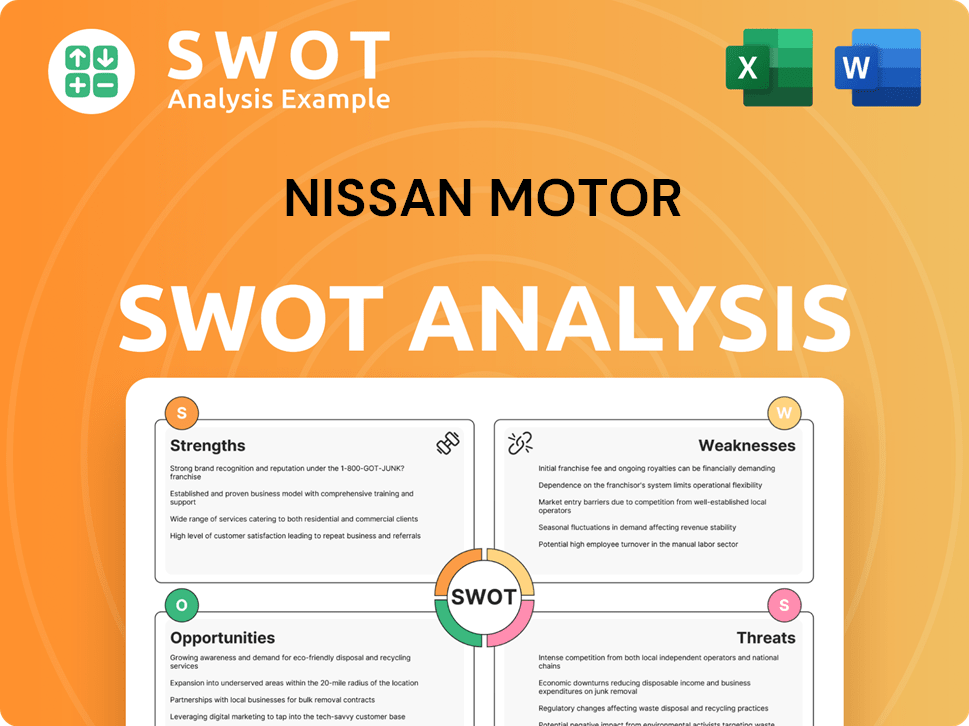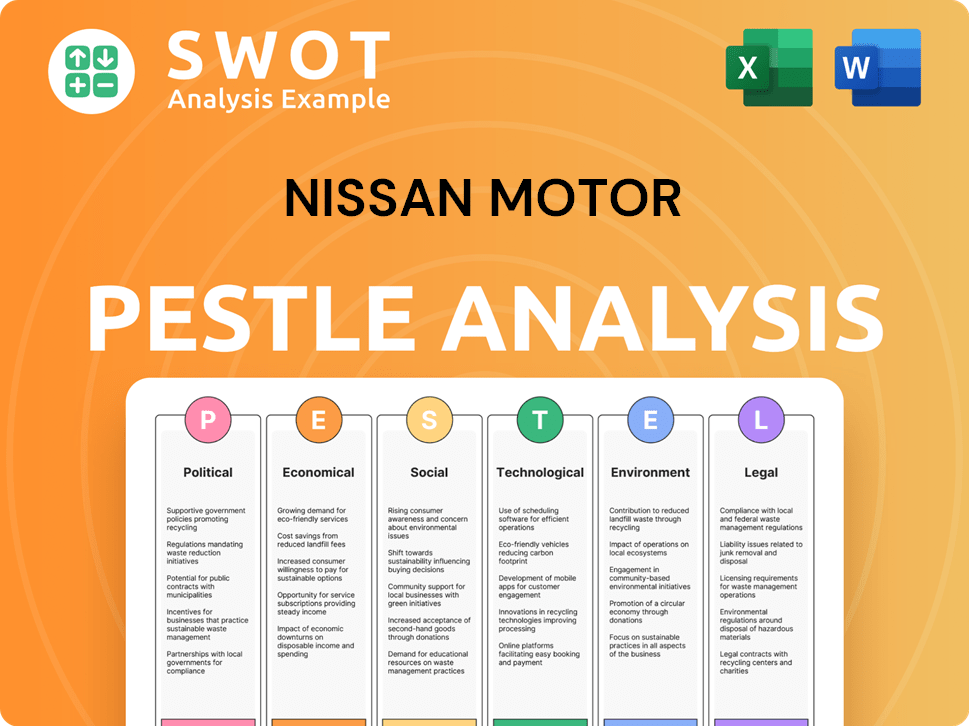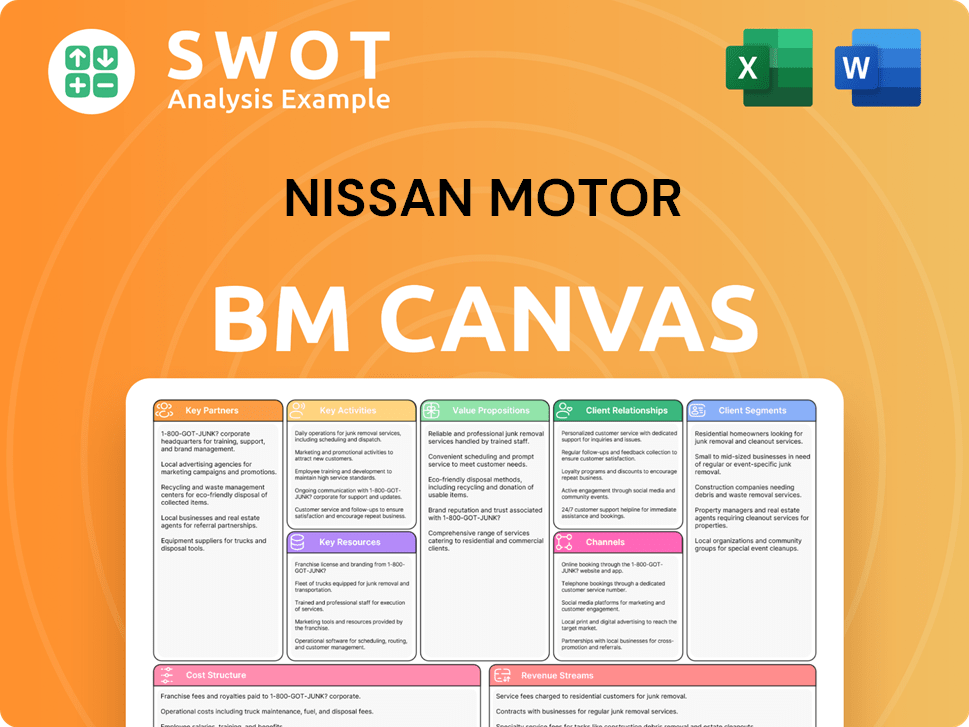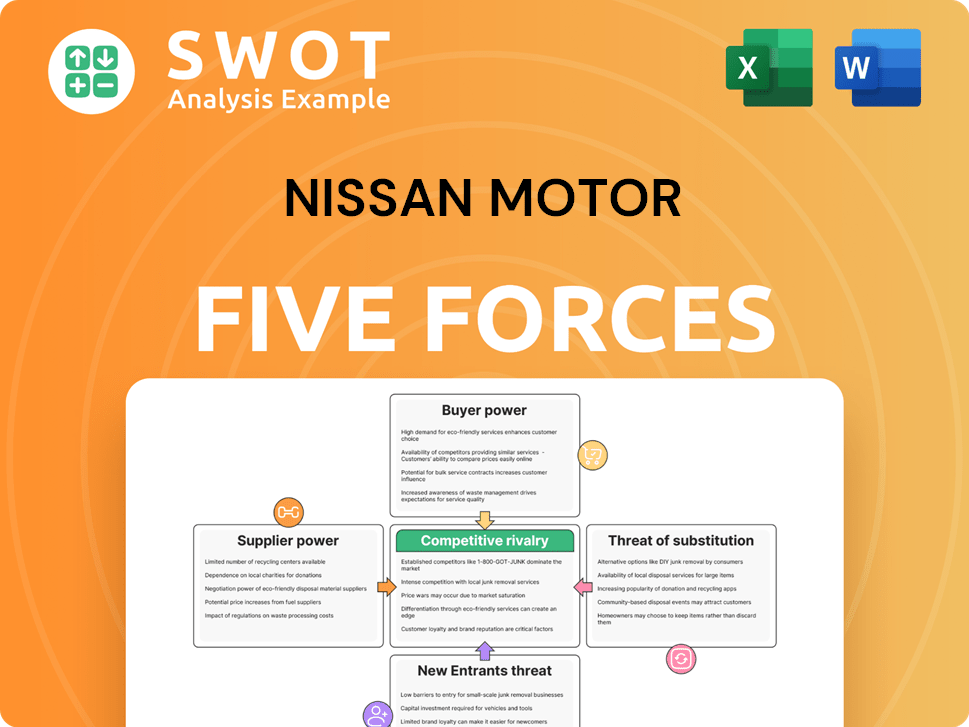Nissan Motor Bundle
What Drives Nissan's Automotive Empire?
Understanding a company's core principles is key to evaluating its potential. Nissan Motor Company, a global automotive leader, operates with a clearly defined mission, vision, and set of core values. These elements shape everything from product development to customer relations, influencing its long-term success.

Delving into Nissan Motor SWOT Analysis, we see how these principles translate into action. Exploring "Nissan's mission" and "Nissan vision" reveals the company's strategic goals. Examining "Nissan core values" provides insight into its corporate philosophy and commitment to its stakeholders, including its employees and customers. Understanding these elements is crucial for anyone looking to assess Nissan's future prospects and its commitment to innovation and sustainability.
Key Takeaways
- Nissan's mission and vision center on innovative mobility solutions and empowering the future.
- Core values like customer focus and innovation guide Nissan's actions and corporate culture.
- Strategic plans such as 'The Arc' and 'Ambition 2030' support mission and vision goals.
- Electrification and sustainability are key focus areas for Nissan's future strategy.
- Adherence to mission, vision, and values is crucial for success in the evolving automotive market.
Mission: What is Nissan Motor Mission Statement?
Nissan's mission is 'to provide unique and innovative automotive products and services that deliver superior measurable values to all stakeholders.'
Let's delve into the core of Nissan's operational philosophy by examining its mission statement. Understanding the Nissan mission is crucial for grasping the company's strategic direction and its commitment to stakeholders. This mission statement serves as a compass, guiding Nissan's actions and decisions in the dynamic automotive industry. The Nissan vision and Nissan core values further complement this mission, creating a cohesive framework for the company's operations.
The mission emphasizes innovation, a key driver for Nissan. This is evident in their investment in electric vehicles (EVs) and autonomous driving technologies. Nissan's commitment to innovation is reflected in its diverse product portfolio.
The mission's focus on delivering 'superior measurable values' extends beyond customers. It encompasses shareholders, employees, and partners. This broad approach indicates a commitment to sustainable business practices.
Nissan aims to provide both innovative products and services. This includes not only the vehicles themselves but also after-sales service, financing options, and digital experiences. This comprehensive approach enhances customer satisfaction.
The emphasis on 'measurable values' suggests Nissan's focus on tangible results. This could involve tracking customer satisfaction scores, vehicle performance metrics, and financial returns. This data-driven approach helps in continuous improvement.
The mission aligns with Nissan's strategic goals, such as expanding its EV offerings and improving its global market share. It also supports the company's efforts to enhance its brand image. The mission provides a clear direction for all strategic initiatives.
The mission implicitly supports sustainability through its focus on innovation and value creation. This includes developing eco-friendly vehicles and implementing responsible business practices. This commitment is increasingly important in today's market.
The Nissan company values are deeply intertwined with its mission, shaping its corporate culture and guiding its actions. The mission statement provides a foundation for understanding Nissan's strategic goals and how it plans to achieve them. For example, Nissan's mission directly influences its investments in electric vehicle technology, such as the Nissan Ariya, and its efforts to improve battery technology, with the aim of reducing environmental impact and enhancing vehicle performance. The mission also reflects Nissan's Nissan corporate philosophy, which prioritizes customer satisfaction, employee well-being, and sustainable business practices. To further understand Nissan's broader strategic approach, consider reading about the Growth Strategy of Nissan Motor.
Nissan Motor SWOT Analysis
- Complete SWOT Breakdown
- Fully Customizable
- Editable in Excel & Word
- Professional Formatting
- Investor-Ready Format

Vision: What is Nissan Motor Vision Statement?
Nissan's vision is 'to empower mobility and beyond.'
Nissan's vision statement, "to empower mobility and beyond," is a forward-thinking declaration that extends beyond the traditional automotive industry. This statement reflects Nissan's ambition to shape the future of transportation and explore opportunities outside of conventional car manufacturing. It's a vision that balances both realistic goals and aspirational targets, positioning the company for sustained growth and relevance in a rapidly evolving market.
The core of Nissan's vision, "to empower mobility and beyond," is centered on providing innovative transportation solutions. This includes not only the design and manufacture of vehicles but also the development of technologies and services that enhance the mobility experience for everyone. The company aims to be at the forefront of the automotive industry's transformation.
Realistically, Nissan is heavily investing in electric vehicles (EVs) and autonomous driving technologies. The company has set ambitious targets for EV sales, aiming for EVs to represent over 40% of its global sales by fiscal year 2030. Nissan's commitment to these technologies is a direct reflection of its vision to empower future mobility.
The "and beyond" aspect of Nissan's vision suggests an openness to new forms of mobility and services. This could include exploring areas like ride-sharing, smart city solutions, and other innovative transportation models. This expansion could allow Nissan to diversify its revenue streams and increase its market influence.
Nissan's vision aligns perfectly with the ongoing transformation in the automotive sector, which is driven by electrification, autonomous driving, and connected car technologies. The company is strategically positioned to capitalize on these trends and maintain its competitive edge. This is part of Nissan's long-term strategic goals.
The vision statement significantly impacts Nissan's product development and innovation efforts. The company is investing heavily in research and development (R&D) to bring cutting-edge technologies to market. For example, Nissan has allocated billions of dollars towards EV development and battery technology, aiming for a significant reduction in battery costs to enhance affordability and competitiveness.
Sustainability is an integral part of Nissan's vision. The company is committed to reducing its carbon footprint and promoting environmentally friendly practices throughout its operations. This commitment is evident in its investments in EVs, renewable energy, and sustainable manufacturing processes. Nissan's commitment to sustainability is a key component of its corporate philosophy.
The "to empower mobility and beyond" vision statement provides a clear direction for Nissan's future. It's a statement that encapsulates the company's aspirations to lead in the evolving automotive landscape. Understanding Nissan's global history provides further context to how this vision has evolved over time. This vision, combined with Nissan's mission and core values, shapes its strategic goals and influences every aspect of its operations, from product development to customer service. The company's commitment to this vision is a testament to its dedication to innovation, sustainability, and its customers, reinforcing its position as a major player in the global automotive market. The company's values and employee engagement are also aligned to this vision, ensuring that all employees are working towards the same goals. Nissan's core values in action are visible in its products and services, showing how the company lives up to its promises. The company's mission statement also supports this vision, providing a clear roadmap for achieving its goals.
Nissan Motor PESTLE Analysis
- Covers All 6 PESTLE Categories
- No Research Needed – Save Hours of Work
- Built by Experts, Trusted by Consultants
- Instant Download, Ready to Use
- 100% Editable, Fully Customizable

Values: What is Nissan Motor Core Values Statement?
Understanding the core values of Nissan Motor Company provides critical insights into its operational philosophy and strategic direction. These values, often reflected in "The Nissan Way," guide the company's actions and shape its corporate culture.
This core value places the customer at the heart of Nissan's operations. It influences product development, service delivery, and the overall customer experience. For example, Nissan's recent focus on electric vehicles and advanced driver-assistance systems reflects its commitment to meeting evolving customer needs and preferences, aiming to increase customer satisfaction scores by 10% in the next fiscal year.
This value emphasizes a data-driven and pragmatic approach to business, fostering transparency and accountability. It is crucial for navigating challenges and making informed decisions based on market conditions and performance. This is evident in Nissan's response to the fiscal year 2024 net loss, where they implemented recovery plans and cost-cutting measures to improve financial performance, aiming for a 20% reduction in operational costs by 2026.
This core value promotes responsibility and proactive problem-solving within the organization. It empowers employees to take initiative and seek solutions to challenges. Nissan's implementation of turnaround strategies and strategic partnerships, such as the alliance with Renault, demonstrates this commitment to proactive action, with the aim of increasing production volume by 15% over the next three years.
Innovation is a cornerstone of Nissan's identity, encouraging creative thinking and the exploration of new ideas. This value is reflected in Nissan's technological advancements, particularly in electric vehicles and autonomous driving systems. The company's investment in new technologies and R&D, accounting for 8% of revenue in the last fiscal year, highlights its commitment to innovation and future-proofing its product line.
These Nissan core values collectively shape the company's culture and drive its strategic goals. They emphasize customer focus, data-driven decision-making, accountability, and innovation. To further understand how these values translate into action, explore how the Nissan mission and Nissan vision influence the company's strategic decisions, and learn more about the Revenue Streams & Business Model of Nissan Motor.
How Mission & Vision Influence Nissan Motor Business?
Nissan's mission and vision are fundamental in shaping its strategic direction, driving its operational decisions, and influencing its overall corporate identity. These guiding principles are crucial for navigating the dynamic automotive industry and achieving long-term success.
The Nissan mission to deliver unique and innovative automotive products and services is directly reflected in 'The Arc' business plan. This plan focuses on a product offensive, including launching 30 new models by fiscal year 2026, with 16 being electrified, showcasing a commitment to innovation.
- 'The Arc' plan aims for over 30 new models, with 16 being EVs.
- The plan includes achieving an operating profit margin exceeding 6% by the end of fiscal year 2026.
- Nissan's strategic goals are centered around achieving 40% electrified vehicle sales globally by fiscal year 2026 and 60% by the end of the decade.
Nissan's vision to 'empower mobility and beyond' is the cornerstone of its long-term strategy, particularly 'Ambition 2030'. This vision underscores the company's dedication to electrification and expanding mobility possibilities. This vision is supported by ambitious targets for EV sales.
The influence of Nissan's mission and vision extends to its strategic partnerships and product development initiatives. The $661 million investment in a deal with SK On for US-built EV batteries exemplifies this, aiming to enhance EV competitiveness and production localization.
Nissan's strategic goals, such as achieving an operating profit margin of over 6% by the end of fiscal year 2026, underscore the integration of financial discipline with strategic objectives. This demonstrates how Nissan strategic goals are aligned with its mission and vision.
Despite recent financial challenges, including a net loss in fiscal year 2024, Nissan's leadership remains committed to its turnaround plan and long-term vision. CEO Ivan Espinosa's statements highlight the mission and vision as a framework for both long-term planning and navigating immediate challenges.
The Nissan vision statement explained guides the company's long-term perspective, ensuring adaptability to changing market conditions. This is crucial in the fast-evolving automotive industry, where innovation and sustainability are key drivers.
Nissan's commitment to its mission and vision drives its focus on innovation and sustainability. This includes the development of electric vehicles and the pursuit of eco-friendly manufacturing processes, aligning with global trends and consumer demands. Learn more about Nissan's marketing strategies by reading Marketing Strategy of Nissan Motor.
In essence, Nissan's mission and vision are not mere statements but the driving forces behind its strategic decisions, product development, and long-term goals. Understanding how these elements influence the company is key to appreciating its direction and future prospects. Now, let's delve into the core improvements to the company's mission and vision.
Nissan Motor Business Model Canvas
- Complete 9-Block Business Model Canvas
- Effortlessly Communicate Your Business Strategy
- Investor-Ready BMC Format
- 100% Editable and Customizable
- Clear and Structured Layout

What Are Mission & Vision Improvements?
While Nissan's current Nissan mission, Nissan vision, and Nissan core values provide a solid framework, strategic enhancements can further solidify its position in the rapidly evolving automotive landscape. These improvements focus on strengthening sustainability commitments, embracing technological advancements, and fostering circular economy principles.
Integrating explicit, measurable sustainability goals directly into the Nissan mission or a prominent supporting statement would amplify its commitment. For instance, the vision could be updated to include a phrase like "driving a sustainable future of mobility," aligning with the Nissan Green Program 2030, which targets a 30% reduction in per-vehicle lifecycle CO2 emissions by 2030. This proactive approach is crucial, especially considering the growing consumer demand for environmentally responsible products; data from Statista indicates a steady increase in consumer preference for sustainable brands.
Clearly articulating Nissan's strategy for leveraging emerging technologies, such as artificial intelligence and connectivity, is essential. While the current strategy mentions intelligent vehicles, a more explicit statement on their role in shaping the future of connected and autonomous mobility could be impactful. The global autonomous vehicle market is projected to reach $62.12 billion by 2030, according to Allied Market Research, highlighting the importance of a clear technological vision.
Enhancing the Nissan vision or Nissan core values to reflect a stronger commitment to circularity in products and operations is crucial. Given the increasing importance of the circular economy and evolving consumer behaviors, this would demonstrate a forward-thinking approach. The circular economy market is experiencing significant growth; a report by Grand View Research projects the global circular economy market to reach $820.8 billion by 2028.
Regularly reviewing and refining Nissan's strategic goals and their communication to internal and external stakeholders is essential. This includes ensuring that the Nissan company values are consistently reflected in all aspects of the business, from product development to customer service. A clear and consistent message about Nissan's corporate philosophy helps build trust and brand loyalty. To understand the target audience of Nissan, read Target Market of Nissan Motor.
How Does Nissan Motor Implement Corporate Strategy?
Implementing a company's mission, vision, and core values is crucial for translating strategic intent into tangible results. This involves aligning business operations, corporate culture, and employee behavior with the organization's overarching goals.
Nissan's commitment to its mission and vision is evident in its strategic initiatives, most notably through the launch of 'The Arc' business plan. This plan serves as a roadmap to achieve the ambitious goals outlined in the Ambition 2030 vision. It provides concrete steps and targets for various aspects of the business, ensuring a focused approach towards achieving its strategic goals.
- Product Offensive: 'The Arc' plan includes a significant product offensive with a strong focus on electrification. Nissan aims to launch 30 new EV models globally by the end of fiscal year 2030.
- Electrification Strategy: Nissan plans to increase its global EV sales mix to 40% by fiscal year 2026 and 60% by fiscal year 2030.
- Investment in EV Battery Production: Nissan is investing in EV battery production in the US, demonstrating its commitment to future mobility. The company plans to have a battery production capacity of 130 GWh by fiscal year 2030.
- Market Expansion: Nissan is expanding its presence in key markets, including China and North America, to drive growth.
Leadership plays a pivotal role in reinforcing the Nissan mission, vision, and core values. CEO Ivan Espinosa has actively promoted 'The Arc' plan, emphasizing its importance in navigating market changes and driving value creation. This leadership commitment ensures that the strategic goals are communicated effectively throughout the organization.
Nissan's corporate culture, known as 'The Nissan Way,' is designed to align employee behavior with its stated values. This framework incorporates principles such as 'Always think of the customer' and 'Dare to do what others don't,' fostering a customer-centric and innovative environment. This approach helps to ensure that employees understand and embody the company's core values.
Nissan's Integrated Report 2024 highlights the connection between its business progress and the Ambition 2030 vision, with sustainability at its core. The company’s commitment to sustainability and social responsibility is formalized through programs like the Nissan Green Program 2030 and Nissan Social Program 2030. These programs have specific goals and action plans to ensure that the company’s efforts contribute to a cleaner, safer, and more inclusive world.
Nissan actively monitors and reports on its progress toward achieving its strategic goals. The company's annual reports and sustainability reports provide detailed information on key performance indicators (KPIs) and the impact of its initiatives. For example, Nissan's commitment to sustainability includes targets for reducing carbon emissions and increasing the use of renewable energy. You can learn more about the company's overall goals, including its Nissan's global mission.
Nissan Motor Porter's Five Forces Analysis
- Covers All 5 Competitive Forces in Detail
- Structured for Consultants, Students, and Founders
- 100% Editable in Microsoft Word & Excel
- Instant Digital Download – Use Immediately
- Compatible with Mac & PC – Fully Unlocked

Related Blogs
- What are Mission Vision & Core Values of Nissan Motor Company?
- What is Competitive Landscape of Nissan Motor Company?
- What is Growth Strategy and Future Prospects of Nissan Motor Company?
- How Does Nissan Motor Company Work?
- What is Sales and Marketing Strategy of Nissan Motor Company?
- Who Owns Nissan Motor Company?
- What is Customer Demographics and Target Market of Nissan Motor Company?
Disclaimer
All information, articles, and product details provided on this website are for general informational and educational purposes only. We do not claim any ownership over, nor do we intend to infringe upon, any trademarks, copyrights, logos, brand names, or other intellectual property mentioned or depicted on this site. Such intellectual property remains the property of its respective owners, and any references here are made solely for identification or informational purposes, without implying any affiliation, endorsement, or partnership.
We make no representations or warranties, express or implied, regarding the accuracy, completeness, or suitability of any content or products presented. Nothing on this website should be construed as legal, tax, investment, financial, medical, or other professional advice. In addition, no part of this site—including articles or product references—constitutes a solicitation, recommendation, endorsement, advertisement, or offer to buy or sell any securities, franchises, or other financial instruments, particularly in jurisdictions where such activity would be unlawful.
All content is of a general nature and may not address the specific circumstances of any individual or entity. It is not a substitute for professional advice or services. Any actions you take based on the information provided here are strictly at your own risk. You accept full responsibility for any decisions or outcomes arising from your use of this website and agree to release us from any liability in connection with your use of, or reliance upon, the content or products found herein.